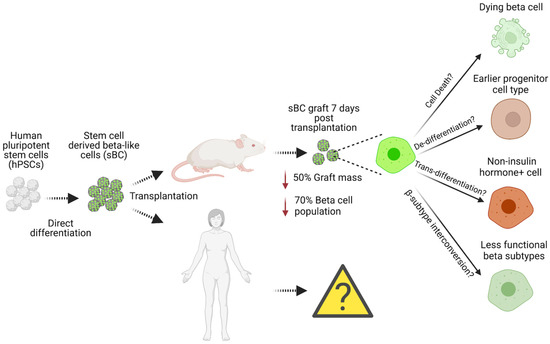Hurdles in Stem Cell Transplantation
A topical collection in Cells (ISSN 2073-4409). This collection belongs to the section "Stem Cells".
Viewed by 3630Editor
Interests: human pluripotent stem cells; direct differentiation; pancreas; thymus; insulin producing beta cells; autoimmune diabetes; genome editing; genetic lineage tracing
Topical Collection Information
Dear Colleagues,
In the last few years, regenerative medicine approaches employing stem cells and the cells derived from them have witnessed tremendous progress. Indeed, many preliminary safety and efficacy trials aiming to develop innovative treatment options for a variety of diseases are currently ongoing, demonstrating the excellent prospects of this translational research field. However, despite these rapid advances, many distinct challenges involved in the transplantation of stem cell products remain to be comprehensively addressed. These challenges include, but are not limited to, the reproducible production of specific cell types, tissue organoids and cell therapy products, as well as the effective delivery of stem-cell-derived transplants, immediate and long-term graft survival and challenges of an immunological nature. For this collection, entitled “Hurdles in Stem Cell Transplantation”, we welcome original research contributions that focus on solutions to the obstacles defined above, as well as other challenges in the field of regenerative medicine.
Dr. Holger Russ
Guest Editor
Manuscript Submission Information
Manuscripts should be submitted online at www.mdpi.com by registering and logging in to this website. Once you are registered, click here to go to the submission form. Manuscripts can be submitted until the deadline. All submissions that pass pre-check are peer-reviewed. Accepted papers will be published continuously in the journal (as soon as accepted) and will be listed together on the collection website. Research articles, review articles as well as short communications are invited. For planned papers, a title and short abstract (about 100 words) can be sent to the Editorial Office for announcement on this website.
Submitted manuscripts should not have been published previously, nor be under consideration for publication elsewhere (except conference proceedings papers). All manuscripts are thoroughly refereed through a single-blind peer-review process. A guide for authors and other relevant information for submission of manuscripts is available on the Instructions for Authors page. Cells is an international peer-reviewed open access semimonthly journal published by MDPI.
Please visit the Instructions for Authors page before submitting a manuscript. The Article Processing Charge (APC) for publication in this open access journal is 2700 CHF (Swiss Francs). Submitted papers should be well formatted and use good English. Authors may use MDPI's English editing service prior to publication or during author revisions.







